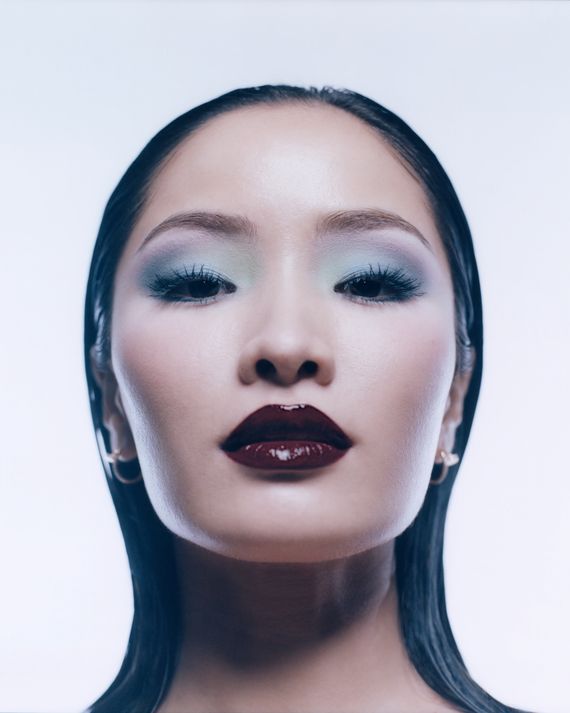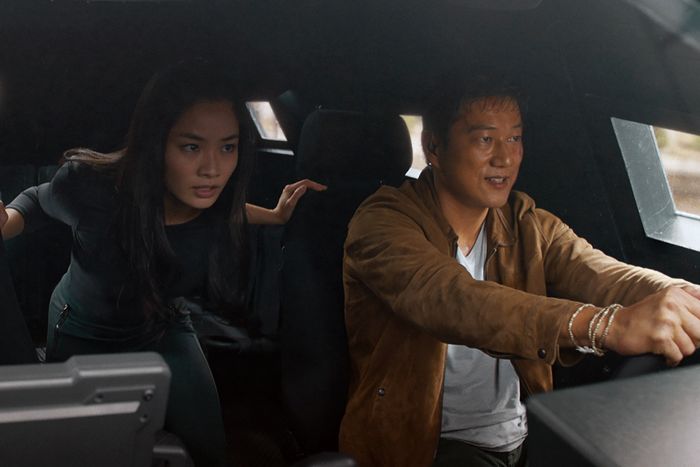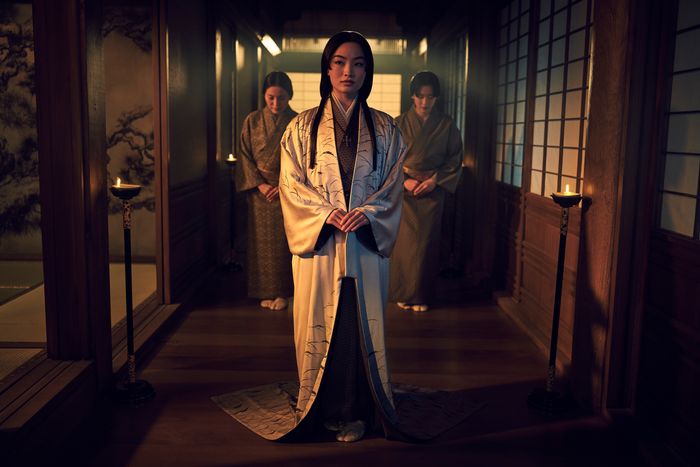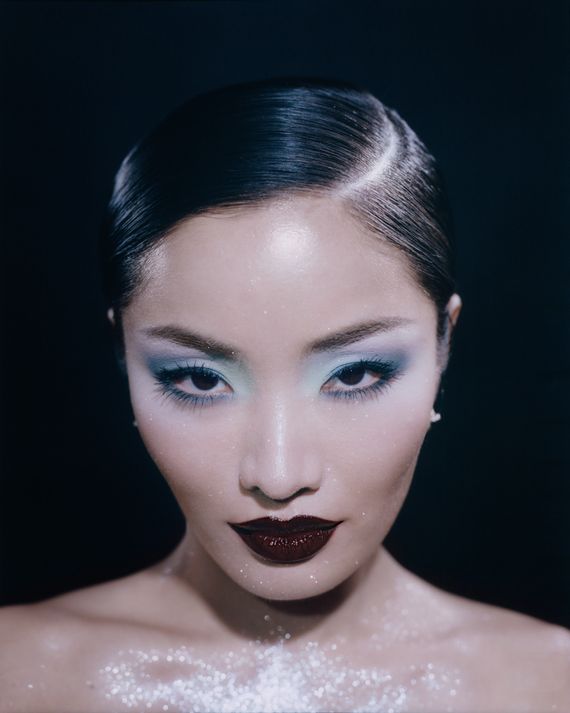
This interview was published on September 4, 2024. At the 2024 Emmys, Shōgun star Anna Sawai won the award for Outstanding Lead Actress in a Drama Series.
On a blistering July afternoon, the actress Anna Sawai and I sit in polite silence as we watch our tea being prepared. We are at Setsugekka on the Lower East Side, a tiny spot founded by a tea master from Chiba, Souheki Mori, who wants to introduce New Yorkers to the quieting ritual of the traditional Japanese tea ceremony. Mori isn’t around today. Instead, two smiling young white men in yukata whisk bowls of brilliant-green matcha as loud electronica pulses over the speakers.
“It’s very round,” Sawai says, sipping her drink. “Very strong. I love it.” She welcomes the caffeine. Just hours ago, she was muscling through a battery of Zoom press interviews. Her only break was to watch Sheryl Lee Ralph and Tony Hale announce the year’s slate of Emmy nominees on a livestream. Sawai received a Lead Dramatic Actress nod for her work as Lady Toda Mariko on FX’s Shōgun, and she’s favored to win.
Sitting at the counter in jeans and a white T-shirt, she projects an easy, professional calmness, as if today were just any other day. When I bring up that I had recently moved to British Columbia, where Sawai shot Shōgun in 2021 and the sci-fi series Monarch: Legacy of Monsters in 2022, she breezes me through a torrent of recommendations. “The food is so good!” she exclaims. “Have you been to Kissa Tanto? Try to get a reservation there.”
On Shōgun, Sawai delivered the most compelling performance in one of the buzziest shows of the year. The series, led by showrunners Rachel Kondo and Justin Marks, adapts James Clavell’s best-selling novel about the power struggle between two lords in Sengoku-period Japan and an English naval pilot, John Blackthorne, who gets stuck in the middle. Shōgun had been dramatized once before as an NBC television event in the ’80s starring Richard Chamberlain and Toshiro Mifune, but Kondo and Marks’s version inverts the source material by shifting its emphasis away from Blackthorne and toward its Japanese characters — including, and especially, Lady Mariko.
Mariko starts out the series in limbo, the daughter of a disgraced samurai who wants to honor her family’s memory by ritual suicide but is denied a redemptive death by her bitter husband, Buntaro (Shinnosuke Abe), to whom she’s bound by societal structure. Her fate changes when Blackthorne (Cosmo Jarvis) washes ashore and is captured by the enterprising Lord Yoshii Toranaga (Hiroyuki Sanada, who is also a producer). Toranaga realizes how useful Blackthorne could be as a political wedge between the other lords battling for influence. He conscripts Mariko, a converted Catholic who speaks a common language with the Englishman, as translator. As the show progresses, romance blossoms for Mariko and the Englishman, but their relationship ultimately takes a back seat when Lord Toranaga’s machinations finally give Mariko some agency. Her story culminates in an act of sacrifice that shatters the influence of Toranaga’s rival and fulfills her wish to redeem her family.
Shōgun was a huge hit. The first episode broke FX’s record for most-streamed debut, only growing from there, and it racked up the most Emmy nominations for an individual series in this awards cycle. It’s part of a steady wave of cross-national productions and imports exposing American audiences to more subtitled programming than ever before — Squid Game, Call My Agent!, Pachinko, Tokyo Vice, reality shows of all languages — and a testament to the globalizing influence of the streaming era. The series is also a rare thing on American television in how it foregrounds a fundamentally non-western perspective. True to history, its Japanese characters commit seppuku with little flinching or exoticization by the camera’s eye.
On the screen, Sawai possesses a stillness that makes her well suited for somber characters weighed down by past and circumstance. As Cate Randa in Monarch, she’s a schoolteacher who has to cope with PTSD while navigating her father’s disappearance and the byzantine dangers of a grand conspiracy. In the 2019 British-Japanese crime drama Giri/Haji, she plays Eiko, the daughter of a yakuza boss who rubs up against the constraints of her world. The Fast & Furious franchise is basically a cartoon these days, but Elle, her character in F9, is dealing with the trauma of watching her parents die in a car explosion. Sawai carries that same stillness in person, but it’s paired with a sunny disposition. “I don’t worry too much,” she says. “I have this weird confidence in me that things will work out.”


Sawai, 32, spent the bulk of her upbringing in Japan, but her early childhood stretched across the globe. Her father worked in electronics (though “he likes to say he modeled a little bit,” she says, laughing), and his job took the family to New Zealand, the Philippines, and Hong Kong before they resettled in Japan when she was 10. “Japan will always be home,” Sawai says, “but some Japanese people will look at me and be like, Oh, she’s not completely Japanese. There’s some foreign element to her.” She says it’s partly because of her mannerisms: “I’m a little bit more vocal at times. I use my hands when I’m talking.”
As a kid, she was obsessed with Angelina Jolie’s Tomb Raider movies and Hamtaro, an anime featuring cheerful hamsters, and she loved to listen to her sister’s Spice Girls and Britney Spears albums. “I was like, I want to be Britney,” she recalls. Shortly after her family moved back to Japan, her mother, looking for something for Sawai to do, signed her up to audition for Annie, which the Nippon TV corporation had staged annually as a national theatrical production since 1986. Anna was devastated when she didn’t get a callback. That’s when her mother imparted a foundational piece of wisdom. “She always taught me that if you want to do something that’s different from what other people are doing, then you’re going to have to work when everyone’s playing,” she says. She proceeded to spend each day of the following year grinding out script practice. She was cast as Annie the next time she auditioned.
Not long after, in 2007, Anna joined Avex, a Japanese talent-management conglomerate, where hopefuls pay for — or, in Anna’s case, audition into — a program training them to become professional singers or dancers. It’s an extremely competitive system with few trainees actually getting to debut under the Avex label. By the time she was 14, she was training seven days a week; on school days, she would commute for an hour by train to get to the academy.
Anna knew she wanted to act more than sing. At 15, she got her first acting credit, playing a rebellious young ninja named Kiriko in Ninja Assassin, James McTeigue’s neo-noir martial-arts flick produced by the Wachowskis. By that point, she was already well within the Avex system, but the Japanese conglomerate wasn’t particularly equipped to help its talent navigate the film-and-television business — a casting director working for McTeigue had come around by chance looking for an English-speaking Japanese actress. The role was relatively small, ending with Kiriko’s death early in the movie, though her time on set left a strong impression on the people around her. “Anna was always so confident in who she was as a person and an actor, even at that age,” says McTeigue, who also directed 2005’s V for Vendetta. “You could tell she was going to do great things.” The role made Anna more certain she wanted to make the leap into acting. But her Avex handlers convinced her instead to join FAKY, a J-pop group they were developing for an international audience, which they framed as a project she could work on alongside acting opportunities.
Sawai’s experience with FAKY was mixed at best. Part of the original lineup, she sang in Britney-inflected English and Japanese with dutiful gusto. The act never really gained steam, though, and her responsibilities to the group frequently curtailed her screen aspirations. As she told The Hollywood Reporter in April, Avex prevented her from auditioning for The Suicide Squad when the casting call came around, claiming that she would hold up the schedules of the other members. “I was a pretty vocal person when I first joined,” she says. “But I remember someone telling me that if I said my opinion out loud, I’d be considered a diva.” Still, she advocated for herself enough that Avex began to bring her what television work it could find, roles that often didn’t have names.
In 2018, when she finally broke away from Avex, she did so with little more than a personal Gmail address on her IMDb account. It didn’t take long for Sawai’s fortunes to shift. The next year, she was filming a meatier role on Giri/Haji, one of the last things she booked with Avex, when Jake Miller, a talent manager based in Los Angeles, randomly checked out Ninja Assassin, which had resurfaced on streaming services at the time. “Some people have an innate watchability to them, and she has that in spades,” Miller says. He looked on IMDb to see if she had been in anything since and found her contact information. “Sending that email was one of the best spur-of-the-moment decisions I’ve ever made in my life,” he says.
Working with Miller and his team was the first time anybody took Sawai’s acting ambitions seriously. “For a long time, I was trying to be a good girl who’s easy to work with because I thought that’s what the industry wanted from me,” she says. Sending audition tapes from Tokyo, Sawai came close to booking a few high-profile projects, including Gina Prince-Bythewood’s The Old Guard, in which she would’ve starred alongside Charlize Theron. Before long, the gigs started to come in rapid succession. She worked on F9 in 2019, which she describes as a good set to be green on. “It’s super-chill,” she says. “Vin’s on the scooter going around greeting everyone. Tyrese is throwing jokes out there. Michelle will walk in with her big speaker on.” Pachinko came the following year; Shōgun, her first lead role, the year after that. After filming wrapped, she started work on Monarch right away.
She’s grateful for Shōgun’s nuanced characters. “There’s so much more representation today, but there’s still a lot of misrepresentation,” she says. “I’ve been in projects where I’ve thought, Well, it’s not really us, but sure. After Shōgun, I now feel I have to stand up for myself and my community in Japan.” She’s rethinking the kinds of roles she can envision for herself. “I had totally allowed myself to believe the only thing that I can do is to be young and to do action and wear a high-school uniform,” she says of her early years in the industry. “I didn’t really question it too much.”
Two days after we met in New York, she flew down to Australia to begin production on the next season of Monarch. Filming has been taking up most of her attention, which is why the Emmys continue to seem a little abstract for her when we catch up over Zoom in mid-August. “It feels so strange!” she says. “Everyone in L.A. is getting excited for the Emmys, and I’m here in work mode focusing on what’s in front of me.” Still, anticipation is creeping in as she attends to a key detail for her first ceremony: talking to her stylist about whom she’s going to wear. “I’m bringing a special someone with me as well, so that’s going to be very meaningful,” she says before stopping herself. “Wait — I shouldn’t be talking about such things yet, right?”
If Sawai wins on September 15, she will be the second Asian woman to nab a lead-acting award. She would also be the first Japanese woman to do so with just one other ever having come close: the late Yoko Shimada, who was nominated for playing the same character in the original 1981 NBC adaptation. “It would mark such an important step,” she says. “But I have no control over what’s going to happen, you know?”
More gold rush
- What Makes Us So Sure Sean Baker Can Sneak Anora Into the Oscars?
- Coulrophobia Strikes the Movies League
- The MFL’s Opening Weekend is in the Books



